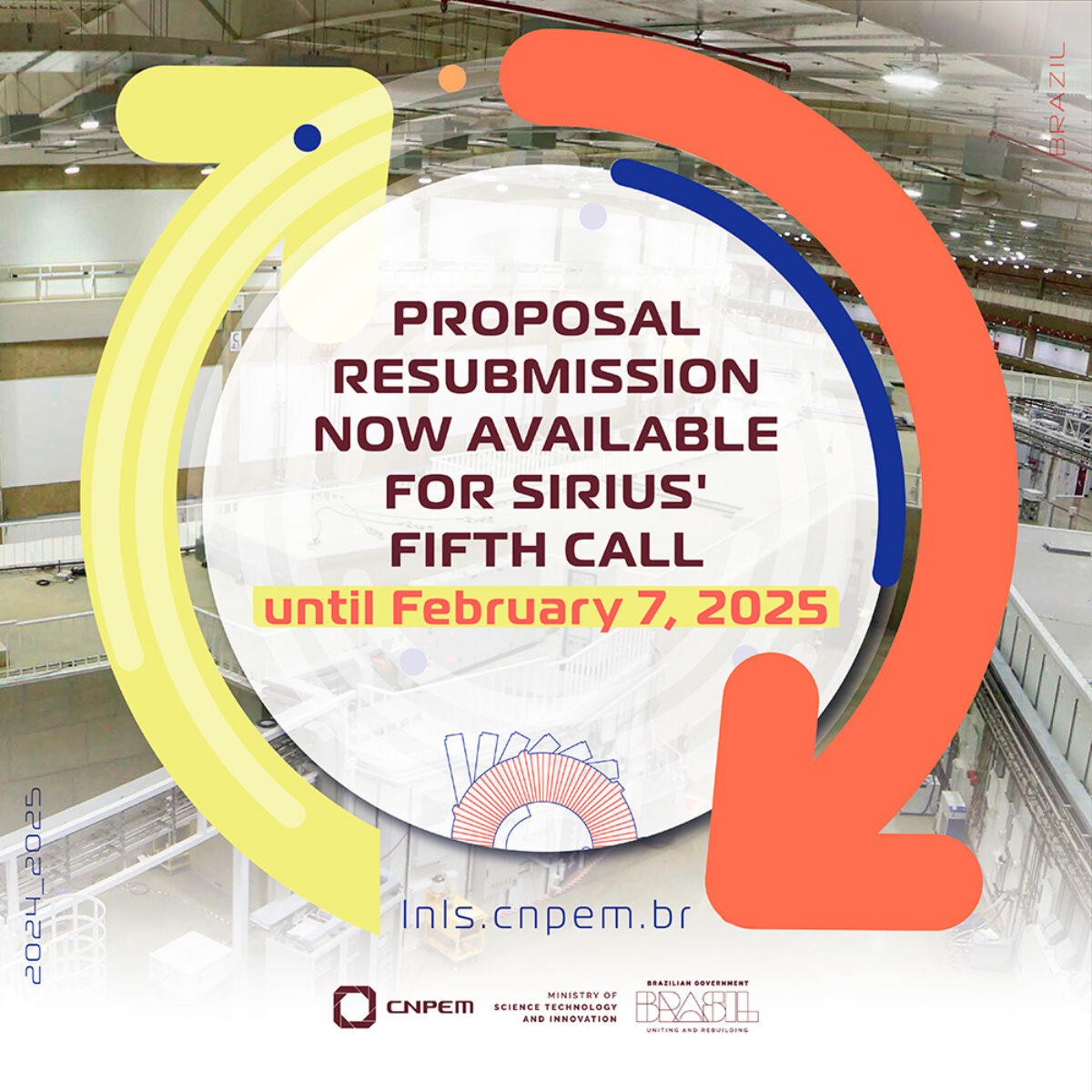
Proposal resubmission became available on January 20, 2025 on the SAU Online submission platform
SAU Online platform now allows the resubmission of the proposal sent in the last cycle
The Brazilian Center for Research in Energy and Materials (CNPEM), an organization overseen by the Ministry of Science, Technology and Innovation (MCTI), has opened its fifth regular call for research projects at Sirius on December 9th, 2024. The call will remain open until February 7th, 2025.
In order to recognize proposals of high scientific merit that were not selected in the last call due to high competitiveness, the resubmission of well-evaluated and unapproved proposals will be allowed, without requiring a new evaluation, and will also receive an increase of 0.2 to the score of the evaluation received.
The possibility of resubmitting proposals was made available on January 20, 2025 on the SAU Online submission platform. Users who wish to resubmit should click on the “Resubmit a proposal” button. When opting to resubmit, no editing of the proposal will be allowed. If there is a need to edit or supplement the proposal, the researcher is advised to submit a new proposal. As in the conventional submission process, the researcher who resubmits a research proposal must perform the AdHOc review of five other research proposals.
More details about the new submission method can be found in Information for Users – LNLS, in the Proposal Evaluation Process section.
All PIs who submit a proposal are expected to provide detailed opinions on the technical and scientific quality of five other research proposals. These opinions should assess the clarity of the description of the samples, the indication of preliminary studies that justify measurements with synchrotron light, as well as the technical and scientific relevance of the proposal. PIs who perform reviews that do not contain detailed opinions on the technical and scientific quality of the proposal will be penalized in the final grade of their proposal.
More information about submitting proposals and financial aid can be found in Information for Users on the LNLS website. If you still have questions, please contact the Users Office at edu@cnpem.br.
Although they are not part of this regular call for proposals, the Sapucaia and Quati beamlines, dedicated respectively to Small-Angle X-ray Scattering (SAXS) and X-ray Absorption Spectroscopy (XAS) techniques, will be available during the first half of 2025 in scientific commissioning mode, where users will be able to conduct experiments that assist in the fine-tuning of these beamlines. These experiments are expected to take place in the second half of 2025.
The Brazilian Synchrotron Light National Laboratory (LNLS) works with scientific research and technological development that involves synchrotron light, focusing on the operation and utilization of the multidisciplinary potential of Sirius, the country’s most advanced scientific infrastructure. With ten research stations already online and open to the scientific and industrial communities, Sirius allows thousands of researchers from various areas to test their hypotheses about the microscopic mechanisms responsible for the properties of both natural and synthetic materials used in a variety of fields such as health, the environment, energy, and agriculture. LNLS is part of the Brazilian Center for Research in Energy and Materials (CNPEM) in Campinas, São Paulo, a private non-profit organization overseen by the Ministry of Science, Technology, and Innovation (MCTI). https://lnls.cnpem.br/
The Brazilian Center for Research in Energy and Materials (CNPEM) is home to a state-of-the-art, multi-user and multidisciplinary scientific environment and works on different fronts within the Brazilian National System for Science, Technology and Innovation. A social organization overseen by the Ministry of Science, Technology and Innovation (MCTI), CNPEM is driven by research that impacts the areas of health, energy, renewable materials and sustainability. It is responsible for Sirius, the largest assembly of scientific equipment constructed in the country, and is currently constructing Project Orion, a laboratory complex for advanced pathogen research. Highly specialized science and engineering teams, sophisticated infrastructure open to the scientific community, strategic lines of investigation, innovative projects involving the productive sector, and training for researchers and students are the pillars of this institution that is unique in Brazil and able to serve as a bridge between knowledge and innovation. CNPEM also operates the Brazilian Synchrotron Light (LNLS), Biosciences (LNBio), Nanotechnology (LNNano), and Biorenewables (LNBR) National Laboratories, as well as the Ilum School of Science, which offers a bachelor’s degree program in science and technology with support from the Ministry of Education (MEC). https://cnpem.br/
The fifth call for proposals for research at Sirius will run from December 9, 2024 to February 7, 2025
Change represents a major advance in beamline research capabilities